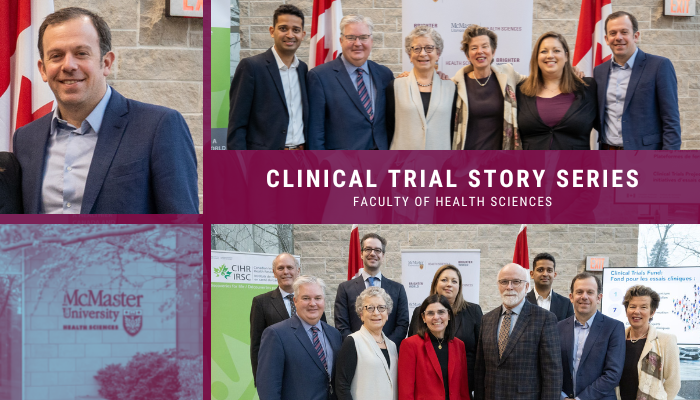McMaster researcher testing potentially life-saving treatment for people with breathing difficulty

Bram Rochwerg is behind one of seven McMaster-led research projects that have received a total of $61 million from the Canadian Institutes of Health Research (CIHR) to advance medical research, training and innovation.
McMaster University researcher Bram Rochwerg is receiving $3.4 million in federal funding to test a potentially life-saving therapy for people experiencing acute breathing difficulty, or acute hypoxemic respiratory failure (AHRF).
Rochwerg is trialling the use of corticosteroids, which work as immune suppressors that reduce lung inflammation, as a possible remedy for AHRF. Previous studies have shown they help people with COVID-19-related AHRF.
“The corticosteroid dexamethasone was one of the first therapies proven to benefit people hospitalized with COVID-19 and has now become the standard treatment in this patient subset,” said Rochwerg, associate professor of the Department of Medicine.
AHRF is one of the most common reasons for people being admitted to the intensive care unit (ICU), as it is a common complication of COVID-19, pneumonia, or illness elsewhere in the body such as pancreatitis or sepsis. People admitted to the ICU with AHRF often require extra help with their breathing or to be put on life support through a ventilator.
Rochwerg says it remains unclear if corticosteroids will help people with non-COVID AHRF, as well as how long treatment should be maintained. The biggest COVID-19 study of corticosteroids used a short 10-day course of dexamethasone, but if people treated with it still did not improve, then it is unclear if this treatment course should be extended.
“We will attempt to answer both these questions in our clinical trial platform,” said Rochwerg.
“We will examine corticosteroids in patients with non-COVID AHRF who require extra breathing support, as well as people with either COVID or non-COVID related AHRF who have already been treated with 10 days of dexamethasone but still need breathing support to see if there is benefit in extending treatment,” he said.
“The main outcome we will measure is mortality after 60 days.”
The funding for Rochwerg’s research was announced by the Canadian Institutes of Health Research (CIHR) and Filomena Tassi, Minister of the Federal Economic Development Agency for Southern Ontario on Jan. 19, as part of the Government of Canada’s new clinical trials consortium, training platforms, and research to improve the health of Canadians.
Related stories:
McMaster researchers receive $61 million from CIHR to advance health research
